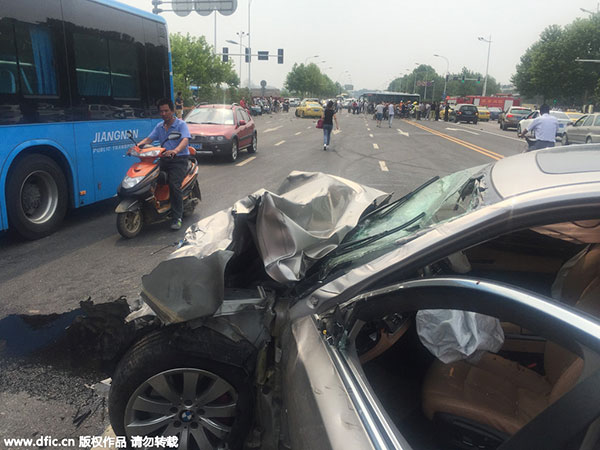|
 |
|
The force of impact destroyed the front end of the Mazda involved in the accident. [Photo/IC] |
Conspiracy theories thrive when corruption and wrongdoings erode the credibility of a government or a government department. This applies to even traffic accidents.
On June 20, a BMW car traveling above the permissible speed limit jumped the red light at a crossing in Nanjing, East China's Jiangsu province, and crashed into another car, killing two innocent people. Now, more than two months after the accident, the culprit has been diagnosed with mental health issues. This means he, at the time of the accident, had limited capability of disposition and thus could get away with a much lighter sentence than a crime of such nature should entail.
A medical institution that is qualified to conduct such examinations made the diagnosis. But irrespective of the reasons the institution and local traffic police have cited for its authenticity, the diagnosis has met with an avalanche of questioning from both online and print media.
Immediately after the accident, local traffic police officers were asked whether the BMW driver was traveling above the permissible speed limit at the crossing. "The car was a little faster than the ones nearby", they said. But they didn't say why they were so confident about their claim.
Later, a video clip gave the lie to the traffic police officers' claim, compelling them to admit that the BMW was indeed traveling at 195.2 kms per hour, much faster than the permissible limit.
So, why did the traffic police officers lie in the beginning? It could not have been a slip of the tongue. There seemed no reason for the police officers to argue in favor of the culprit, whose love for speed and disregard for traffic rules claimed two innocent lives. This made the public adequate reason to assume that the culprit might have personal connections with the traffic police department or the traffic police officers had been bribed to stand by him. It is because of their own doing that the local traffic police officers are in the spotlight for all the wrong reasons.
Also, it was naive of the local traffic police authorities to assume that the public would be convinced by the medical diagnosis of the driver, which says it is possible that he hardly knew what he was doing at the time of the accident, because his temporary mental disorder limited his capability of disposition.
There is one more important point, though. If it were true that, as the driver's family claims, he had demonstrated serious signs of temporary mental disorder when he was a teenager and even a few days before the accident he had showed signs of abnormal mental condition, then why didn't the members of his family stop him from driving the car, which if involved in an accident could also have killed him?
Theories of conspiracy will keep swirling on the Internet and WeChat until the traffic police authorities and the institution that conducted the medical test on the driver can prove their cleanness, which seems highly unlikely.
The fallout of the case could prompt other traffic accident culprits to seek similar medical examinations to prove they have mental health issues tin order o get lighter sentences. And if temporary mental derangement becomes an easy way out for traffic accident offenders to escape the punishment they deserve, it will further wear away the credibility of local governments and traffic police authorities.
The author is a senior writer with China Daily. zhuyuan@chinadaily.com.cn